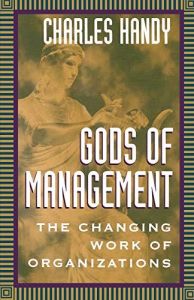Join getAbstract to access the summary!

Join getAbstract to access the summary!
Charles Handy
Gods of Management
The Changing Work of Organizations
Oxford UP, 1996
What's inside?
A philosopher compares today’s management styles to the archetypal figures of mythological Greek gods.
Recommendation
Philosopher Charles Handy compares today’s dominant management styles to the qualities of four mythological Greek gods. Drawing archetypal inspiration from Zeus, Apollo, Athena and Dionysus. Handy breaks down the subtle differences that inform competing approaches to management. He argues that today’s managers face making the transition from a hierarchical corporate Apollonian culture to a more diverse, democratic one. In this evergreen business classic, Handy posits that increased complexity and individualism will fuel a reign of new managerial gods.
Summary
About the Author
Irish philosopher Charles Handy also wrote The Second Curve: Thoughts on Reinventing Society; Understanding Organizations; and Beyond Certainty.


















Comment on this summary